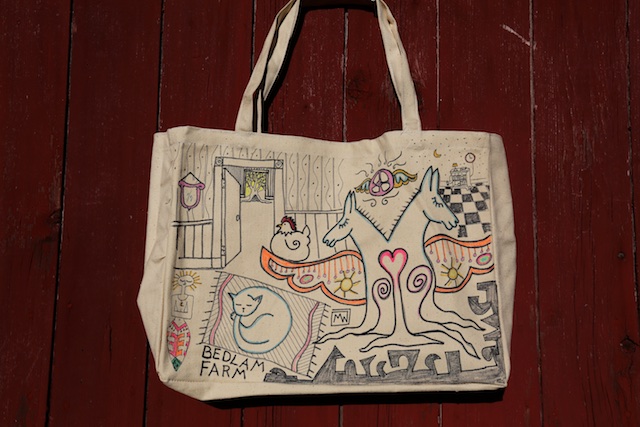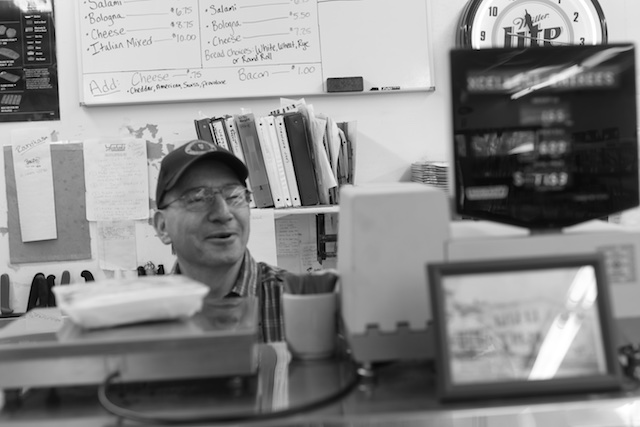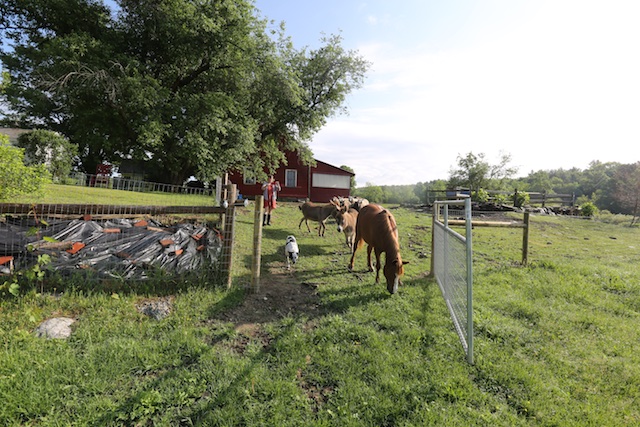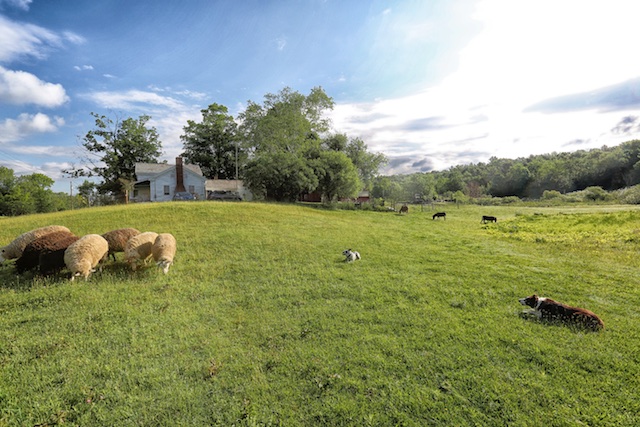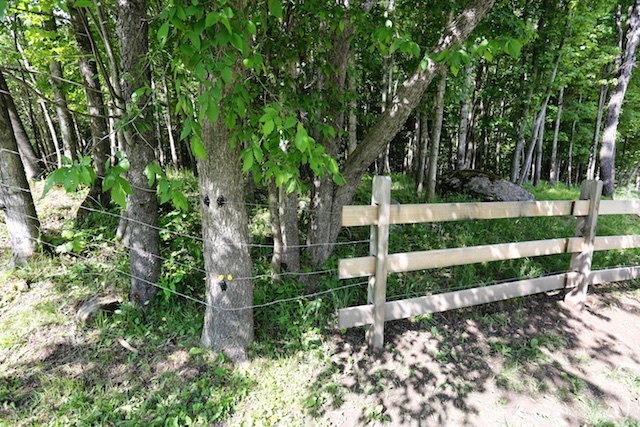
I have not yet spoken with Craig Mosher, although I drove to Rutland, Vt. today to sit in his first interaction with the Vermont criminal justice system. His hearing lasted about two minutes and resulted only in scheduling the next hearing at 3 p.m. on July 11. I will be there then as well.
Ken Norman, my friend and farrier and guardian angel to farmers and animal lovers in distress, came to the hearing also and joined me on my bench.
I don’t know Mosher, but my heart sank for him. I also made it a point to think of Jon Bellis, who died last July in the road outside of Mosher’s property. He was in the courtroom too, in many ways. I did not want to forget him. He is why we all were there. I believe in empathy, it is so essential to being a human being.
He looked quite lost, even stunned in the courtroom, as if he could scarcely believe where he was. Neither could the many friends and neighbors who showed up to cheer him on. The courtroom was SRO.
“This is bullshit,” said a constable who had known Mosher all of his life. “It makes no sense at all.”
It is an awful thing to have the full force of the criminal justice system brought down on a person, especially one who has never been in any kind of trouble with the law, and for decades has run a successful business and lived a life full of work and family and community. Mosher is a little league coach and also considered a local hero.
Joshua Rockwood, the Glenville, N.Y., farmer arrested for having a frozen water tank in – 27 degree temperatures, and many others who find themselves in this position – the animal and farming world is roiling in controversy – can testify that it will be a long year, and a grueling and difficult process for Mosher. If his friends and family and supporters truly stick with him, he can get through it.
Mosher is not only fighting for his freedom, but his reputation and his future, and his soon-to-be depleted bank account. The criminal justice system in America is very expensive, I hate to think what might have happened to Rockwood, a good and honest man, if people all over the country had not raised $70,000 to help his ultimately successful defense.
The patently absurd charges against Rockwood were dropped. Mosher’s case is much more complicated, it involves the death of a human being and charges of extreme and criminal negligence. And the death of a human is perhaps the most important thing a judge and jury will ever consider.
The case seemed even more troublesome this week when State Police affidavits claimed Mosher’s animals – cow and bull – had escaped at least five times, and that Mosher had been warned by a truck driver minutes before the accident that killed Jon Bellis that his bull was out by a nearby motel. According to the police, Mosher did nothing and soon after, Bellis and the bull were both dead.
One or two people recognized me and a reporter e-mailed me asking if I was there. I am sorry to say I am getting too familiar with this.
I passed by Mosher as he parked his truck outside of the courthouse, and then met him again in the men’s room. We smiled at one another but didn’t speak, almost as if we ought to know one another but didn’t dare take the step. He seemed a nice man to me, courteous, quick with a smile, he had many close friends. It is something I look for at court hearings, I wonder how many people would come to cheer me on if I were in that kind of trouble.
Not as many as came to cheer Mosher.
That does say something about a person.
I didn’t want to bother him by introducing myself, he had other things on his mind than me. I knew meeting me would make him uncomfortable, and I know his lawyer told him not to speak to anybody. I was not allowed to take photographs inside the courtroom, which was large, clean, pleasant, and crammed with Mosher’s friends and supporters.
As always, I was searched and frisked, my big camera checked. (I was not allowed to use it.)
__
I want to say a couple of things about this visit and this story:
First off, I do not know and will not expect to know the details of the tragic accident that led to this court hearing. It is not for me to judge anyone.
Mosher is in the system now. There is no doubt that the business of owning an animal is being criminalized, I have been to more criminal hearings as an author writing about animals than I saw in months as a police reporter in Philadelphia.
It was eerie in Rutland, I feltl like a combat reporter dropping on a war zone, and in a way, that is what the deepening conflict in America between people who understand animals only as pets, and people who live and work with animals, is.
Every farmer I know feels embattled by clueless prosecutors and politicians, fanatic animal rights informers, and animal lovers who know absolutely nothing about farms or about animals that are not dogs or cats, and think all animals should be treated like dogs and cats. I know nothing about this prosecutor, mostly because she will say nothing.
I will not be poring over affidavits and court documents and deciding of Mosher is guilty of involuntary manslaughter. The good reporters of Vermont can do that, and that is the ultimate job of the judicial process, not people on Facebook. I was not there.
__
The prosecutor, whose name is Rosemary Kennedy, made me uneasy, not because of the indictment but because of the appearance she is giving of hiding behind the grand jury process. She claims she can’t speak about the Mosher case because grand jury proceedings are secret. That is like Donald Trump saying he can’t release his tax returns because they are being audited.
Prosecutors are in complete control of grand jury proceedings. A favorite saying of defense attorneys is that a grand jury will indict a ham sandwich if the prosecutor asks them to. And of course Kennedy can discuss the broader issues of the case – why she chose so extreme a penalty for a tragedy that has always been considered an accident, even if there is negligence – without divulging any details of the grand jury hearings.
Mosher is 61, he could go to jail for fifteen years.
Several people at the hearing told me that Kennedy is removing all critical or questioning comments on her Facebook Page as soon as they appear, and she refused to explain the case to a group of concerned county legislators who met with her last week on another matter.
A judge and jury will have to decide Mosher’s guilt or innocence now, not me, but something does feel wrong about it. I can’t be any more specific than that. It’s just what I feel in my gut, and over the years, I have a good if not perfect record gut-wise. A reporter often has to live by his or her instincts, they are often better than reports and affidavits. I was a good reporter.
The portrayal of Mosher as a callous and arrogant and lazy and reckless man does not fit the man who built those fences I photographed above. Nor do they fit the hero who jumped on his tractor after Hurricane Irene and spend several days – without getting pay – clearing roads and freeing panicked and trapped residents and tourists.
Several women told me stories of Mosher appearing through the mud and muck to clear their roads or take them to the pharmacy for medicine and the grocery store for food after Irene. “He saved us,” said Gloria, who is 77 now. “We will try to save him.”
It’s possible, I suppose, that he is a Jekyll and Hyde, but so far, that is a stretch for me.
After the hearing, I drove out to Killington, about 20 minutes outside of Rutland, to visit Mosher’s home and look at his fences. I live on a farm, and have many friends who are farmers, and I know that fences say a lot about the people who built them.
Mosher’s fences are impressive, they are carefully built to keep animals inside. There is four-strand barbed wire and sturdy three plank hewn wood. The fences run over many acres, they cost a lot of money.
The pastures are beautiful, perfect for sheep, bulls, donkeys and cows.
I don’t know what Craig Mosher did that night when his bull got out and a milk truck driver knocked on his door to warn him, but I do know those fences were built by a responsible person who was going to a lot of trouble to keep his animals on his property. He obviously is not someone who doesn’t care.
The Mosher case has sent shock waves throughout the farming and animal communities, in Vermont and elsewhere. If it stands – regardless of what he did or didn’t do – then the lives of every farmer and every animal owner will be affected, and radically. If a precedent is set whereby animal escapes that result in death or injury can now be considered felony crimes, many lives will change, many animals will suffer.
If your dog slips out the door and is hit by a car or truck and the driver is injured or killed, you may end up in the criminal justice system. That is a good reason for many people to avoid animals.
I spoke with a lawyer in Nevada this morning who specializes in civil suits involving animal accidents – Mosher is reportedly involved in negotiating a civil suit with the Bellis Family. She does not know of a single case in the country where an animal accident has resulted the criminal charge of involuntary manslaughter for the owner of the animal. “That is highly unusual,” she said. Vermont appears to be making history, but not owning up to it or discussing it.
The death of a human being is a profoundly troubling thing. To me, the life of a human is much more important than the life of a bull or any animal. But is threatening Mosher with jail the answer.
Also troubling is this: a way of life – the human-animal bond – that has existed for many thousands of years – will be threatened, and in some cases, destroyed if Mosher is convicted of this and/or goes to jail. The scales of justice are pretty tricky sometimes. In this case, a judge and/or jury has to balance a human life, which is sacred, with a precious and important way of life, which is also sacred.
I am no judge or jury, but I will stay with this case and follow and explain it as best I can as it unfolds. It is not my job to judge, but to think and to feel.

